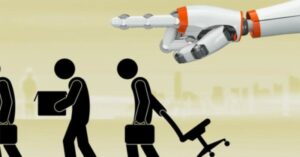 Ezra Klein, writing in Vox, argues that at least over the short to medium-term, robots won’t be taking our jobs. Stating that most jobs a hundred years ago involved the production of food and collection of water, he goes on to note that:
Ezra Klein, writing in Vox, argues that at least over the short to medium-term, robots won’t be taking our jobs. Stating that most jobs a hundred years ago involved the production of food and collection of water, he goes on to note that:
Compared to those ancestors, humans today are a massive useless class. What sort of job is “editor of an explanatory journalism web site” next to “farmer”? Would our ancestors value the work of psychologists or customer service representatives or wedding planners or computer coders?
Many current lawyers fear that their own jobs will be replaced by the legal services version of robots – automated document review, online form generation services – and they almost uniformly will advise students considering law school not to become a lawyer, based on these concerns about declining need for human-provided legal services. But I think the type of transformation identified by Klein with respect to jobs generally applies to legal services as well. Go back in time to the “Bartelby the Scrivener” 19th century era and talk to a lawyer then. They would of course be befuddled by legal specialties relating to not-yet-invented technologies or laws, like Internet, music record label or workers compensation attorneys. But there are now specialties, like white collar criminal, intellectual property, and mergers and acquisitions that were based on activities that occurred back then, but were not conceived at the time as a separate specialty.
If so much can change in the law 50-100 years leading up to now, why should we expect that today’s specialties are set in stone for the next 50 years? Isn’t it reasonable to expect based on recent history that today’s law students will have professional opportunities over their careers that neither we nor they can anticipate?